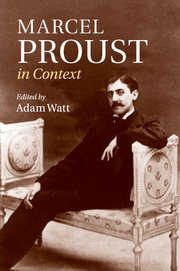Book contents
- Frontmatter
- Contents
- List of Illustrations
- Notes on contributors
- Figure I. Marcel Proust, portrait in oils by Jacques-Émile Blanche, 1892
- Preface
- Figure 2. Proust photographed on his death-bed by Man Ray, 1922
- Note on the text
- Chronology
- Part I Life and works
- Part II Historical and cultural contexts
- i. The arts
- Chapter 6 Proust's reading
- Chapter 7 Decadence and the fin de siècle
- Chapter 8 Paris and the avant-garde
- Chapter 9 The novelistic tradition
- Chapter 10 Philosophy
- Chapter 11 Painting
- Chapter 12 Music
- Chapter 13 Theatre and dance
- ii. Self and society
- Part III Critical reception
- Further reading
- Index
- References
Chapter 10 - Philosophy
from i. - The arts
Published online by Cambridge University Press: 05 November 2013
- Frontmatter
- Contents
- List of Illustrations
- Notes on contributors
- Figure I. Marcel Proust, portrait in oils by Jacques-Émile Blanche, 1892
- Preface
- Figure 2. Proust photographed on his death-bed by Man Ray, 1922
- Note on the text
- Chronology
- Part I Life and works
- Part II Historical and cultural contexts
- i. The arts
- Chapter 6 Proust's reading
- Chapter 7 Decadence and the fin de siècle
- Chapter 8 Paris and the avant-garde
- Chapter 9 The novelistic tradition
- Chapter 10 Philosophy
- Chapter 11 Painting
- Chapter 12 Music
- Chapter 13 Theatre and dance
- ii. Self and society
- Part III Critical reception
- Further reading
- Index
- References
Summary
Like many students, Marcel Proust enjoyed a night out. By early 1895, at the age of twenty-three, and in stark contrast to the popular image of Proust the sickly, bed-ridden recluse, he had become a ‘well-known personality’ in Parisian society, ‘a sort of dandy figure out of Balzac’. According to Jean-Yves Tadié, between January and April 1895, Proust was seen at some eighteen soirées and performances (musical, theatrical). Meanwhile, in spite of the frenetic rhythm of his social and night life, Proust also completed a bachelor's degree in literature and philosophy at the Sorbonne. Between October 1894 and March 1895, he attended lectures in the Latin Quarter delivered by the psychologist and epistemologist Victor Egger (receiving an unremarkable 11/20 for an essay on ‘Socrates' philosophy’), by the idealist philosopher of science and religion Émile Boutroux (whose lectures in 1894–5, judging by the topics set for the written examinations, focused on Descartes and his relation to classical philosophy), and by the aesthetician Gabriel Séailles, under whose instruction Proust became familiar with the work of the German idealists F. W. J. Schelling and Arthur Schopenhauer. He also took private lessons with Alphonse Darlu, his former philosophy master at the Lycée Condorcet (where Proust was a pupil between 1882 and 1889), on whom M. Beulier, the teacher in Jean Santeuil, is often said to be based.
While little is known about the precise content of the philosophical curriculum Proust followed either between 1894 and 1895 or in earlier years, it was, according to Tadié, Boutroux and Darlu who made the most profound impression on the young student. Through their teaching, he was introduced to ‘the notions of faith in the human spirit, Kantian idealism, . . . in a reality hidden behind appearances, and the rigours of analysis, which flew in the face of the misty imprecision dear to the Symbolists and sometimes to Bergson’ (we shall return to the influence of Bergson in due course). For Tadié, ‘this year of studying for his philosophy degree was just as vital for Proust's development as his emotional or social life’. Indeed, in a questionnaire completed around 1895, Proust names Boutroux and Darlu as his ‘heroes from real life’ (ASB, 114; CSB, 337).
- Type
- Chapter
- Information
- Marcel Proust in Context , pp. 75 - 82Publisher: Cambridge University PressPrint publication year: 2013
References
- 1
- Cited by

